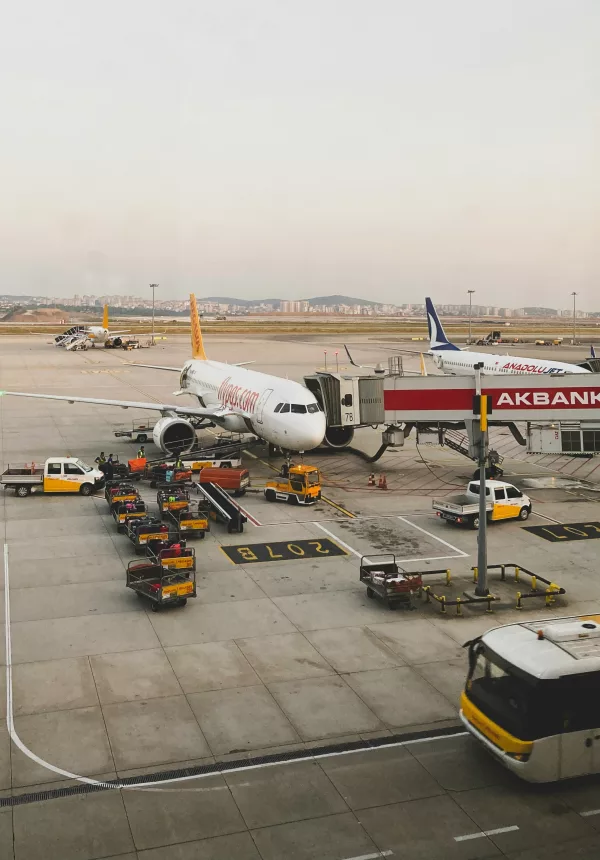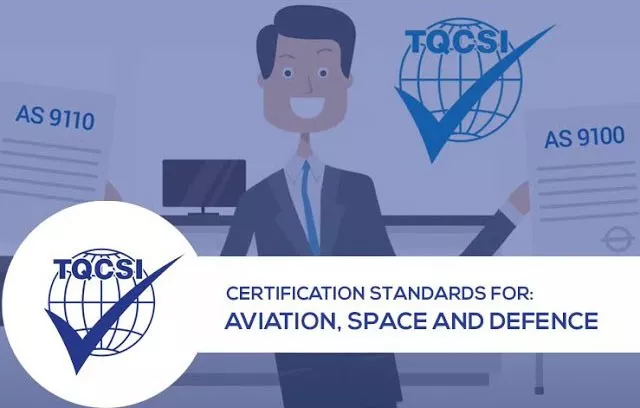What are the AS 9100, AS 9110 & AS 9120 standards?
The AS 9100-series are quality standards specially designed for the aviation, space, and defence (ASD) industry. AS 9100-series builds onto the requirements of ISO 9001, and is a far more comprehensive quality management standard.
By nature, the aviation, space, and defence industry have additional risks associated with high cost, mission-critical products, and services. The highest standards of quality are vital to mitigate these risks, ensuring the safety and success of this industry.
Three ASD specific quality standards have been developed:
- AS 9100D for organisations that design, develop or manufacture (equivalents are JISQ9100 in Japan and EN 9100:2018 in Europe)
- AS 9110C for aircraft maintenance organisations (equivalents are SJAC9110 in Japan and EN 9110:2018 in Europe)
- AS 9120B for distributors of components such as electronics and hardware (equivalents are SJAC9120 in Japan and EN 9120:2018 in Europe).
The AS 9100-series is published by the International Aerospace Quality Group (IAQG) and require ISO 9001 certification as the foundation for the quality management system. IAQG works closely with ISO to ensure the ASD Standards complement the current version of ISO 9001. Focused initially on aerospace organisations, the 2009 version (Revision C) expanded to include aviation, space, and defence organisations. The latest version (Revision D) was published in 2016 and is adopts the same risk management approach as ISO 9001.
Benefits of the AS 9100 series
A certified quality management system is considered fundamental in the aviation, space, and defence industries. By demonstrating your commitment to quality, you can assure your customers and partners that they can always expect the best from you.
The benefits of a certified ASD quality management system include:
Why choose TQCSI to certify your ASD Quality Management System?
TQCSI is the world’s largest JASANZ accredited certification body. Thousands of businesses worldwide, including hundreds of ASD organisations, bear the trademark TQCSI tick of quality. We make the certification process simple with extensive experience, local knowledge, and a trusted framework.
We have highly experienced auditors in our offices all over the world. When you choose TQCSI, you know that you are working with an auditor that understands your operating environment and speaks your language.
Locally, TQCSI is the only certification body to offer AS 9100-series certification, and have a pool of local auditors with Australian security clearances.


Get certified today
It’s never too soon to get started on your certification journey. Whether you have already implemented your QMS or are only just getting started, by engaging us early in the process, we can help you get certified sooner.
Start by calling us todayHow to prepare for AS 9100-series certifications
At TQCSI, we want your path to AS 9100-series certification to be as smooth as possible. To help you get started, we’ve prepared a checklist of items we’ll be looking for during your audit. The first step is to meet the Quality Management System requirements to an ISO 9001 standard, then address the additional requirements for the relevant AS 9100-series standards.
Quality Management System Requirements
A Quality Management System (QMS) requires organisations to:
- Understand their external and internal issues
- Have a Quality Policy declaring senior management’s commitment to quality
- Embrace a risk-based approach throughout the business
- Develop a Quality or Management Manual – documenting as much or as little as you want but, typically, briefly addressing the clauses of ISO 9001
ASD Quality Management System Requirements
An ASD Quality Management System requires organisations to:
- Understand their external and internal issues related to aviation, space and defence quality and safety
- Develop a Quality or Management Manual addressing the clauses of ISO 9001 and the respective ASD Standard
- Have procedures or work instructions to control their operations
- Develop and monitor quality objectives for the relevant ASD standard
- Ensure staff are competent and understand the quality management system
- Ensure customers’ requirements are clearly understood and met
- Design new products and services in a controlled manner
- Control any outsourced work and purchasing of materials
- Control work, so the final product or service is as planned
- Monitor performance and customer satisfaction
- Control nonconformances and nonconforming product
- Take corrective action for significant or repetitive nonconformances
- Conduct internal audits of the quality management system
- Ensure senior management strategically review the quality management system
Additionally, ASD Standards require:
- Product safety to be addressed
- Counterfeit parts prevention to be addressed
- An increased emphasis on risks in operational processes
- Awareness of individual contribution to product and service quality and safety
- Ethical behaviour
- Human factors to be considered in nonconformity management and corrective action
- Configuration management to address stakeholder needs
- Increased emphasis on calibration, certification, traceability and documentation throughout the entire supply chain
- Prevent dispatch of nonconforming product
- Traceability and positive recall of any potentially defective products
- An increased focus on demonstrating that production processes ensure, verify and document products meet key quality and safety requirements at every key stage
- Ensuring that ‘special processes’ such as welding are tightly quality controlled
- Ensuring that key dimensions and product characteristics are met at each stage in the production process
Documentation Requirements for AS 9100 Series Certification
Documentation requirements are the same as for ISO 9001 with additional information to address the relevant ASD standards.
- Quality Policy
- Typically, a Quality or Management Manual
- Procedures or Work Instructions
- Forms
- Quality Improvement Plan (monitoring quality objectives and targets)
- Registers – for nonconformances and corrective action
Implementing Quality Management System
In assessing your ASD Quality Management System, we will audit all the processes, resources, records, assets, and workplace culture against ISO 9001:2015 requirements and the relevant AS 9100-series standard.
A mark of quality for ASD Quality Management Systems
Once certified, you can show your commitment to aviation, space, and defence quality with our certification mark. The TQCSI certification mark for quality is recognised worldwide as the gold standard in Quality Management Systems certification.
AS 9100-series FAQs
For quality, ISO 9001 is by far the most widely used standard in the industry but for the very high standards and safety criticality required in the Aviation, Space & Defence markets, the AS 9100 Series of Standards are used and mandated by many of the Primes, particularly in Aerospace.
These Standards have been developed specifically for the Aviation, Space and Defence sectors and are led by the aerospace industry. They build directly on ISO 9001 for quality as a foundation and add around 150 additional requirements reflecting the higher standards required in safety-critical industries. Similar type standards exist in other industry sectors such as automotive and oil and gas.
- AS 9100: applies to companies who manufacture products – typically the Prime OEMs (Original Equipment Manufacturers) and their suppliers. This is the most widely held standard.
- AS 9110: was developed for companies who service and repair equipment, often called MROs (maintenance, repair and overhaul).
- AS 9120: for distributors of equipment – companies who buy, sell and distribute aviation, space and defence equipment.
The AS 9100 Standards cover many aspects of the operation, but key aspects include:
- Ensuring full traceability of parts – from raw material through to the finished, tested products, and subsequently throughout their life in service, and preventing the use of potential counterfeit parts or material
- Configuration management – to ensure that the correct parts, tools and equipment are always used
- Calibration and recall – ensuring that tools and measurement methods are fit-for-purpose and that processes enable control, traceability and recall of any components that may be out-of-specification
- Product safety – ensuring products perform to their intended purpose. Safety aspects include foreign object damage (FOD) prevention, Tool Control, effective maintenance, control of life-limited parts and airworthiness management.
- Staff – a major element of the standards is ensuring staff are trained, competent and fully understand and work to the required standards, with clear processes for change control, authorisation, certification and control and disposal of nonconforming products
The overall aim of the Standards is to ensure that every component that leaves a facility is fully compliant with all relevant customer and regulatory requirements, and fit-for-purpose.
Yes, there are processes in place to enable customers to change their CB at any point in the 3-year certification cycle.
As they build directly on ISO 9001, companies must be certified to both ISO 9001 and the respective AS 9100 standard. They are also designed to work with and complement other standards such as ISO 14001 for Environment Management Systems, ISO 45001 for Safety Management Systems and ISO/IEC 27001 for Information Security. It is common for companies to be certified to multiple standards depending on the needs of their business and customer requirements.
Absolutely! We are always happy to talk through options and requirements with no obligation to proceed and can provide free quotations for any standards you may be interested in. Please phone us on Freecall 1800 686 739 or email us at: info@tqcsi.com.
Want to know more about AS 9100 Series of Standards?
AS 9100 Series certification ensures the highest standards of quality management and safety in the production of aerospace components and systems. It also facilitates access to global aerospace markets by demonstrating a commitment to excellence and compliance with stringent industry requirements.
Contact your local TQCSI to learn more about the AS 9100, AS 9110, or AS 9120 quality standards for aviation, space, and defence, or email us at info@tqcsi.com




